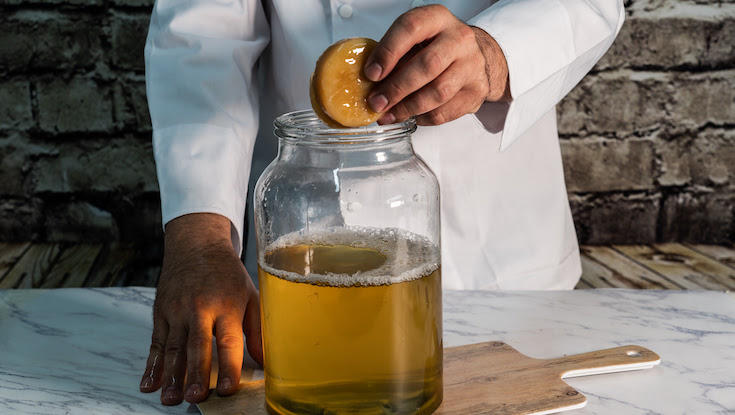Easy Ways to Extract Caffeine From Tea

Have you started to learn more about nutrition recently? If so, you've likely heard some buzzwords about superfoods. Once you start down the superfood path, you're almost certain to come across a beverage called kombucha. This fizzy tea has been getting more and more popular lately, even though it's actually been around for thousands of years. But why, exactly, is kombucha now found in fridges across the country?
Among other reasons, kombucha has become widely celebrated due to its potentially high levels of vitamins and amino acids. Studies have also suggested that there are a few health benefits associated with the tea — another reason why people love to drink it. However, not all experts agree about kombucha's healthfulness. And this raises questions about whether it's the nutritional powerhouse many people think it is. Before you head to the health food store or start home-brewing a batch, find out more about what kombucha is, what it does and whether it's healthy.

Like some other brewed beverages that came before it, kombucha has quite a bit of history backing it up. Kombucha originated in China around 200 B.C. Chinese citizens called this drink the "tea of immortality," as it was believed to have healing properties. From there, it gradually spread across Asia and into Europe before making its way to the Americas. No one is exactly sure how kombucha got its name. It's possible that, after the tea was brought to Japan, some English speakers there mistranslated the Japanese "konbu cha" — a type of liquid made with kelp — and started using the word to refer to the fermented tea instead.
Kombucha tea isn't made with kelp. It's made with water, black or green tea, sugar, and one other special ingredient. What separates this tea from any other is the use of SCOBY, which stands for "symbiotic colony of bacteria and yeast." The bacteria and yeast in this sticky substance eat the sugar in the tea, and this makes them release gases. As a result, kombucha is fermented — and it's fizzy like soda.
People Believe That Kombucha Has Great Health Benefits

Like green or matcha tea, people often drink kombucha for its reported health benefits. Because it's high in probiotic bacteria, the popular drink is credited with improving digestion. It's also said to strengthen the immune system, reduce blood pressure and serve as a detox drink. Some people in health and wellness spheres have also stated that this drink may have weight loss benefits and protect against high blood pressure, heart disease and cancer.
Kombucha is thought to decrease inflammation that causes diseases and to help manage the high blood sugar that occurs with Type 2 diabetes. Interestingly, because of the potential connection between intestinal flora and depression (known as the gut-brain axis or GBA), some people believe that the probiotic bacteria in this beverage can help promote positive mental health. With these proposed benefits, it's no wonder why this drink is flying off the shelves of stores. But kombucha isn't all it's brewed up to be.
Experts Are Unsure About Its Effectiveness

With all those reported health benefits, it seems like kombucha might be a wonderdrink. But, right now, there simply isn't enough research-based evidence about kombucha's overall health effects to make any meaningful conclusions. Claims about this beverage lowering blood pressure or slowing the spread of cancer don't have any scientific backing. Neither do many other claims about it. According to the Mayo Clinic, "valid medical studies of kombucha tea's role in human health are very limited." Some studies suggest that this drink may have health benefits similar to probiotic supplements, but more research is needed.
"We lack a really well-controlled study to say, 'This is from kombucha,'" Dr. Zhaoping Li, professor of medicine and director of UCLA's Center for Human Nutrition, told TIME Magazine. "People kind [of] take the concept [of its proposed benefits] and run with it." Registered dietitian Maria Zamarripa shared with TIME that she and other nutritionists do believe kombucha has beneficial probiotics that support gut health. However, drinking kombucha is no substitute for maintaining a healthy diet.
Although nutrition experts believe that it's okay to drink kombucha regularly, it's important to check with your doctor first. People with kidney or lung disease may experience some negative side effects due to the acid in the drink. People with diabetes may also want to avoid this beverage because of its sugar content. If you have a histamine intolerance, you should also avoid kombucha; because it's fermented, it does contain histamines.
If you do decide to try kombucha, Zamarripa suggests limiting the amount that you drink — at least at first. "Some people may not tolerate large amounts of kombucha right away," Zamarripa shared in an interview with TIME Magazine. "Start by drinking 4 ounces or less per day, and increase the volume based on your tolerance." To protect your teeth from the acid in the beverage, Clarisa Amarillas Gastelum, an assistant professor in the Department of General Dentistry at Stony Brook School of Dental Medicine, recommends drinking your beverage in one sitting rather than sipping throughout the day. She also notes you should use a straw and rinse your mouth with water after finishing.
While scientific studies may be inconsistent and unclear on the true health benefits, people across the world feel that this drink is beneficial and may not experience harmful health effects. Only time — and especially more research — will tell whether this drink is truly healthy.
Resource Links:
"Is Kombucha Healthy? Here's What Experts Say," via TIME
"The health benefits of kombucha," via Chicago Tribune
"2,000 years of kombucha: A very brief history of the world's favorite fermented drink," via Vox
"Are There Benefits to Drinking Kombucha?," Via The New York Times
"Kombucha tea: Does it have health benefits?," Mayo Clinic
taylorcortall1997.blogspot.com
Source: https://www.symptomfind.com/nutrition-supplements/what-is-kombucha-should-you-give-this-tea-a-try?utm_content=params%3Ao%3D740013%26ad%3DdirN%26qo%3DserpIndex&ueid=105d984c-953c-4c00-bd3c-a3a59382c548
0 Response to "Easy Ways to Extract Caffeine From Tea"
Postar um comentário